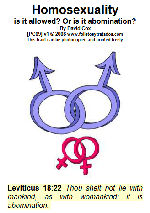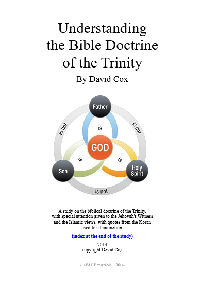Ads
Verses against Calvinism: Introduction
By Pastor-Missionary David Cox
(Note: This post is a work in progress, and I will be adding to it over time, so please check back regularly to see if I have added new “chapters”.)In this post, I am simply listing and examining different verses that in my opinion teach doctrine directly against Calvinism.
I grew up in a church environment that was Calvinist. I loved our pastor, but I did not agree with his doctrine of Calvinism. As I watched him over the years, his personal testimony was a man of God that truly desired to see men saved. I noted as someone in the church asked him to visit a family member or friend in the hospital 5-8 hours away, and he dutifully went and witnessed to that person.
Over the years since then, I have met many Calvinists of different “colors and flavours”, and I note very keenly that the doctrine of Calvinism leads all that follow it into a common destiny, but many Calvinists seem to be truly saved people who refuse this destiny.
Calvinism is a theological system “that leads” people, or “takes them” to someplace. The final destiny of Calvinism is spiritual apathy. The conclusion given beforehand, and to which all its doctrines, teachings, and conclusion have to do obeisance, is spiritual apathy.
Simply put, the main focus of Calvinism is its own view of election, i.e. God has chosen beforehand those who will be saved, without any view or consideration of any action or character or moral element within that person. The doctrine of total depravity insists that man cannot act morally (nor react to the gospel) without God totally regenerating that individual. Within man’s self, there is no “ability to decide” to accept God’s offer of salvation, and yet, Calvinist purists even deny the concept of an offer in salvation because God does not “offer”, He pre-installs salvation in the election, and damnation to hell is pre-installed in all the rest. This conclusion leaves us with one-sided view of salvation which Calvinism teaches, it is all of God, and man in no way participates except to passively receive it, and even refusal of that salvation is impossible (Irresistible Grace).
As such, if all of this poppy cock is any way true and biblical, then the general drift of all biblical statements, doctrine, Scriptures entirely considered, should support Calvinism, (which they don’t). We should not see any presentation of man’s salvation “conditioned” on man’s receiving, but rather on God’s foreknowledge, God’s electing. This just doesn’t “jive” (harmonize) with the vast drift of Scripture.
Calvinists try to be “cute” by opening up all the acts and workings of God, and explaining all this to us in their great intelligence and superior understanding of Scriptures. But wait a minute, God is not schizophrenic (working completely different, as two different people in two vastly different ways). God is not a liar either, so what God presents to us has to be explained in harmony through Scripture, or it is just simply wrong.
The issue here is what saves a person, his faith in Jesus Christ, or God’s electing him completely separate and independent of anything he is or does? The Calvinist’s position when clearly understood, simply steals the “ability” (they teach Total Depravity, but they explain it as Total Inability) of deciding or exercising faith from the individual. God has to create that faith before and independent of the individual according to the Calvinist.
God does inspire faith in Him. God is a faithful person. God’s Word and promises are faithful, and do and should inspire faith in all that see or hear these things. But there is an individual element in each person that makes that individual responsible before God. The Bible no where commands us “to be elect”, because as understood by Calvinists, that would be absurd. You cannot place election as an action on man, he is passive in it.
But Scripture full and abounding with exhortations from God to men to “do something” to be saved. The presentation of Scripture is one that if you, individually, do not “do such-and-such”, then you will not be saved. This constant forcing upon man a decision, an action, a change in his being or he will suffer eternal perdition is in itself a clear teaching of Scripture, and goes against all that Calvinism stands for.
At this point, I will vent my dislike for Calvinism (which I have been measuring and muting it up to this point). Satan wants us to NOT MAKE THAT DECISION, NOT TAKE THAT ACTION. This is Satan’s handiwork clear and simple. When a doctrinal philosophical system like Calvinism aligns itself so clearly and simply, pressing upon all its followers the issue of spiritual apathy, inactivity, and senselessness if they even try, then we see a demonic element in the system of Calvinism. I am against those who hinder the work of God. Calvinism cannot be taken as biblical nor good in any way, shape, or form, not even 2 or 3 of the points, because the whole system, whether you personally accept all of it or not, the whole system leads its followers to the same destiny, spiritual apathy. While you may refrain from “going all the way” into hyper-Calvinism, if you are on the road, you are on the road, and the destiny is not where you want to go.
In this post, I will make quick observations about verses that obviously present a different truth from Calvinism. These verses “ride” on the element of what is salvation? what gives a person salvation.
Confession of Christ
Matt 10:32 Whosoever therefore shall confess me before men, him will I confess also before my Father which is in heaven. 33 But whosoever shall deny me before men, him will I also deny before my Father which is in heaven.
What Jesus teaches here is simply that salvation (His recognition as an individual as a child of God, as being saved or not) hinges on a public confession of Jesus Christ by that individual as that person’s personal Savior. This is linked with faith (trust) in Jesus, but the activity of confessing Christ is “what gives that person his salvation”.
Why would Christ implicate confession as the key to salvation when election is the key? Election is not even mentioned. Whether God foreknew that individual and elected him or not, the presentation of “getting salvation” by Christ is simply not based on election here in this verse.
Rom 10:9 That if thou shalt confess with thy mouth the Lord Jesus, and shalt believe in thine heart that God hath raised him from the dead, thou shalt be saved. 10 For with the heart man believeth unto righteousness; and with the mouth confession is made unto salvation.
Paul makes the clear and unavoidable link between our public confession of Jesus (when coupled with heartfelt, sincere “belief” or “faith”) as what gives us salvation. In literally hundreds of places, Scripture speaks of salvation as being conditioned on something we do, or some spiritual change in ourselves that foments external physical acts. Faith in Jesus as your Savior WILL ALWAYS AND WITHOUT EXCEPTION cause you to confess Christ publicly.
Christ identifies a spiritual activity (believing in the heart) with what gives man salvation. There is absolutely no recourse to election or predestination, nor to this being “pre-installed” in us, nor in distinguishing Paul’s hearers into two groups, elect (“listen to me here”) or non-elect (Paul saying, “Don’t listen to me hear”). The charge, the offer, the condition is given to all equally, and its effect or consequences are promised if the individual, any individual without distinction, complies with it.
How can God promise salvation based on this spiritual activity within the individual without conditioning it somehow? What if the non-elect should hear this “by accident”, and then act on God’s promise? Obviously we see here a great problem for the Calvinist, and the inevitable path of Calvinism manifests itself again. They have to conclude that God must prevent the non-elect from receiving, acting upon, or believing, making God the agent of unbelief, the agent which detains men from receiving the Saviour. Sure, they will say this is Satan doing God’s bidding, but in the end, if man cannot be a true moral agent, then Satan and then demons cannot either. God has to be who created Satan evil, or made him evil after his creation, pre-programming that being into what he is today.
Calvinism denies the moral agency of spirits and men. God created man in His image, and this has to be as a free moral agent in some form.
Knowing God
The idea of knowing God is what “gives” or “causes” salvation in us is prominent in Scriptures. This “knowing of God” is to know intimitely the person, character, morality, and actions of God. To know God’s being is apparently involved. Compare Deut 4:35; 32:39; 1Jn 5:11,20.
Jn 17:3 And this is life eternal, that they might know thee the only true God, and Jesus Christ, whom thou hast sent.
Eternal life is not a preselection by God of the individual, but is a personal relationship between two people (persons), God and the individual. To be preselected is one thing, and to have a personal relationship is something different. Many a young man “preselects” his future wife to sadly find out later that she does not what to have anything to do with him. A preselection is a desire, but a true relationship is active. God “sees us” and “knows us” from eternity, outside of the constraints of time (for Him), and thus he knows us from before our birth, through each moment of our lives, and throughout eternal future. God is not bound by time, but we are. We should not restrict God to acting as we understand time. Life eternal is this relationship we have with God. God’s foreknowledge, or knowing before or outside of time, is what guides Him in His actions corresponding to our salvation.
Jn 17:25 O righteous Father, the world hath not known thee: but I have known thee, and these have known that thou hast sent me.
“Knowing God” is the key to salvation. This makes the “announcing of God” or giving out of the gospel a great priority for the true child of God, which unfortunately, Calvinists don’t do much because they “see” no sense in it, because they cannot change the eternal destiny of anyone. We see great need here, so we are highly active in missions, evangelizing, and praying, but the Calvinist doesn’t see any sense in this, so he changes his gospel from Jesus died on the cross, “to God has elected some to heaven, the rest to hell, so you cannot change that” (seeking to provoke spiritual apathy). Note that Christ says that the unsaved world is in a state of “not knowing God”, and the true Christians “know” Jesus Christ.
We can see the contrary position equally in Scripture, those who don’t know God are not saved.
2Thess 1:8 In flaming fire taking vengeance on them that know not God, and that obey not the gospel of our Lord Jesus Christ:
The unsaved are referred to as those “that know not God”. Equally they are “those that obey not the gospel”. The lack of correct spiritual activity is what qualifies them as unsaved. Sin in this case is not the reason for their unsaved status, but rather, their lack of correct spiritual activity. This is obviously saying that to be saved, you must “obey the gospel”. The Calvinist does not believe this. Within Calvinism, being unsaved is a consequence of being pre-selected by God for eternal damnation “vessels of wrath” which to the Calvinist, these unsaved have no power over their being a vessel of wrath any more than an elect has over his own election. This is where Calvinism simply breaks down horribly.
We must “do” (obey) the gospel to be saved. This is the message of Jesus Christ, of the Apostles, and of the entire body of ministers which are represented in the Bible. You must “be” active, and “do” in other to be saved. Nowhere in the Scriptures is the idea of faith condemned as a “good work”. Faith is a spiritual activity that “WE DO” and which is absolutely necessary for salvation. It is “own participation” in the salvation act. God does the saving, but we must believe in Jesus Christ before He will act. The Calvinist inverts this, saying God saves us first, and after God saves us, then we believe.
Nowhere in Scripture does anybody infer or state that somebody is saved without first believing. The unilateral presentation is that first the gospel is preached, and then after that, the individual accepts, receives, or believes that gospel presentation, and AFTER THAT they are saved by God. The key element in this sequence of events is first a presentation of the Gospel, second a receiving or believe (which sometimes is presumed), and thereafter salvation.
In the previous chapter, we spoke of “confession” of Jesus Christ as a spiritual activity which we do in order to be saved. This public confession is also a part of our receiving or believing.
Acts 26:18 To open their eyes, and to turn them from darkness to light, and from the power of Satan unto God, that they may receive forgiveness of sins, and inheritance among them which are sanctified by faith that is in me.
Paul gave his testimony to Herod Agrippa, and noted his calling in life was to “open their eyes, to turn them from darkness to light”. Within Calvinism, they would deny that any man could do such a thing. “Knowing God” has to come from God’s election, and only God would be involved in that or capable of doing that. But Paul’s announcing of the Gospel to the unsaved is shown to result in their salvation. Here we observe the Bible presenting a spiritual action (announcing the true gospel of Jesus’ death, burial, and resurrection) done upon the unsaved caused their salvation.
1Co 1:21 For after that in the wisdom of God the world by wisdom knew not God, it pleased God by the foolishness of preaching to save them that believe.
Again we see the spiritual activity of preaching by the obedient ministers of God causing the salvation of the unsaved. One spiritual action by a human being, causes salvation. This is a cause of people entering into heaven.
Jn 20:26 And after eight days again his disciples were within, and Thomas with them: then came Jesus, the doors being shut, and stood in the midst, and said, Peace be unto you. 27 Then saith he to Thomas, Reach hither thy finger, and behold my hands; and reach hither thy hand, and thrust it into my side: and be not faithless, but believing. 28 And Thomas answered and said unto him, My Lord and my God. 29 Jesus saith unto him, Thomas, because thou hast seen me, thou hast believed: blessed are they that have not seen, and yet have believed.
This passage is instructive as to how God causes belief in individuals. Instead of pre-installing belief in a person without any control or personal participation by the individual, God acts on the basis of WHO and WHAT GOD IS. Christ died on the cross. This is a fact. Thomas couldn’t believe it. So Christ told him to thrust his hand into his side. The actions and words of God are what cause belief, and being exposed to them is the key.
1Jn 4:6 We are of God: he that knoweth God heareth us; he that is not of God heareth not us. Hereby know we the spirit of truth, and the spirit of error. 7 Beloved, let us love one another: for love is of God; and every one that loveth is born of God, and knoweth God. 8 He that loveth not knoweth not God; for God is love.
John declares “we are of God”, being that we belong to God, we are God’s possession, God’s children. The knowing of God is implied here. To know God is to respond spiritually to God, to “listen” (i.e. obey) to him. The opposite is to not obey God. These are spiritual actions which define where you belong to God (are saved) or are not. Again, this is not indicated as a God pre-installed election within us given or dictated to us from eternity past. John teaches that this is a spiritual disposition which is our character, our actions, our being. It is what we personally decide and live as our own life.
This “knowing of God” is something that is expressly directed at knowing the character and essence of God. In this case, God is love is the focus (there are other Scriptures that indicate the same thing, such as God is forgiveness). To know God is to express love. Anybody who professes to “know God” but refuses to express love to others simply is lying, is false, is not saved. John goes so boldly as to declare that anybody who does not reflect this character of God (love) that he should have become aware of by knowing God, that person then is not even born again. Spiritual rebirth is defined as this spiritual activity of “knowing God” which is based on “hearing God”, “lending a obedient ear” to God.
John also goes so far as to define all who truly love as being born again. Maybe the hippy movement of the 1960s and 1970s would have thought this was the way to heaven, but God’s definition of love is not sex, but a committed long-term relationship between two people who know each other, and interact with each other in a correct and beneficial way. “The knowing” is defined by the actions of BOTH, each one towards the other. Salvation is not a one way activity or thing, where simply God saves us without any participation on our part.

Baxter Directions for a Peaceful Death is an article of 15 points on a Christian approaching his death and what he should be thinking about. This theme is good for the sick, but everybody should also meditate on these things. (Baxter is reformed).








Hello, your ignorance is destroying yourself. Why don’t you read the Word of God without any prejudice but with absolute humble mind? You will find the truth and the truth will set you free. Shame on you.
Hi Benjamin, Look at what you just said! I read MY BIBLE with an open mind, not through the lens which John Calvin is giving out. You post this on my page against Calvinism, and then say I need an open mind, and just read the Bible. Ditto back at you! If you would read the Bible instead of Calvinism, you would not come to the conclusions Calvin and Calvinism put forth. It simply is not obvious, nor really there. I notice that your railing defense of Calvinism is simply, “not so”. You give no logic, no verses, nothing!?!?!? I would answer your objections, but I cannot find any logic, any interpretation of verses, or anything to answer?
Admin,
I have a few Calvin brothers that support the 5 points of Calvin.
I was not able to answer or refute there Ideas until I started reading your material of course with loving eyes, and tried to be neutral but deep in my heart I was thinking maybe pride is the main issue regarding the view of Calvin I am right and everyone is wrong. Why defend a man views then focus on Jesus only, and power by Holy Spirit.
by the way I enjoyed your view point and article. Peace
Benjamin, what a strange attack you offer. No Scriptural refutations, but instead trying to shame a fellow believer. Such a response displays a trait sadly often encountered in dedicated Calvinists: judgment and condemnation of others, and spiritual pride. Where is the love of your neighbour that Jesus taught us? We are after all Christians first and foremost. We do not follow men but Jesus — and as He promised, we are guided in that by the Holy Spirit. So please do not let the 16th century merely human teachings of Calvin frame your reading of Scripture. When we follow people we can easily go astray with all the best of intentions. Let Jesus guide you instead through the Holy Spirit. Choose to identify as Christian instead of Calvinist. Then you will be a blessing to God and to your fellow human beings as well.
Thank you for sharing this. I completely agree. I teach Bible study at one of the military academies here in the US. I come across other teachers who teach through the Calvinist lenses and little impact is made in lives of cadets who sit under them because the teacher believes “whatever is predestined will be”. Ultimately leaving the discipleship experience with little to offer to the cadet who is seeking understanding of salvation as many are atheists. I couldn’t put my finger on the right word for the “destiny” in which they believe but you hit it right on “spiritual apathy”. If God didn’t come for all man than why did he send Jesus. Aren’t we programmed to accept our end since we don’t have a choice anyway?
I also think Jonah is a perfect example of Calvinism and the supernatural power of God in a person IF we accept to participate in His works to save people.
I simply wanted to thank you very much all over again. I am not sure the things I might have accomplished without those aspects shown by you on such problem. It had been a real distressing condition in my view, nevertheless taking note of a specialized way you resolved the issue forced me to jump with happiness. I’m just happy for this assistance as well as hope you really know what a powerful job that you are carrying out instructing most people thru a blog. I’m certain you have never come across all of us.
I like this blog very much so much superb info .
Look i understand people get confused and deceived as GOD himself said to check the Spirits, to make sure we are under the right one. GOD clearly Teaches that SATAN comes as false light and deceive many. You may think it is GOD but it is of SATAN, That is Clearly the Teaching of CALVINISM. GOD warns us all of these False Preachers and Teachers. Matthew 7 describes them all very well. It’s a Warning to all who claim to be Followers of GOD. Psalms 139:23-24 Have GOD look at our Hearts and see where we stand with him.
I agree with you that I don’t accept the teachings of Calvinism. They consider Calvinism as if Jesus has returned as John Calvin to set all the doctrine of the church correct with Calvinism. Calvin influenced the civil authorities in his time to kill those who differed with him on his doctrines. Jesus was killed just like that, but a religious court. The only way God will drag the heretics before him and punish them will be in the end times. We are not to do that now.
Having made that point, I reject their false doctrines. I am a missionary in Mexico and I can even agree with a Roman Catholic in their doctrine of the Trinity, one God three persons, against a Jehovah’s Witness. But we must be careful in all that we do to neither identify with false doctrine nor work with those who put forth false doctrine. I grew up under Calvinism. There are some in Calvinistic churches and teaching that I believe are truly saved. I cannot “lump” all Calvinists into being unsaved or false teachers or both. Since I knew anything about Calvinism, there was always the questions, “are you Calvinist?” “How many points of the Tulip do you accept?” Calvinists among themselves when they “let their hair down” admit that not everything that is thrown around as “Calvinism” is what they believe in. After a lot of study, I find that Calvinism regular uses the bait and switch. Do you believe once saved always saved? They answer with they believe in the perseverance of the saints, which they quickly associate as being the same thing as eternal security. It is not. Eternal security is against the possibility of losing your salvation to be saved again. Perseverance is the all of the election will eventually “come around” to salvation. It is part of their belief system on election. We have no decision or part in being saved. We are passively saved, against our will because there is nothing good in us that would make us respond to God’s invitation.
As a point of fact, I have seen Calvinists, Calvinist pastors, and Calvinist missionaries that “use” and “abuse” perseverance of the saints in their own case, and think nothing of drinking alcohol like pagans, romances outside of their marriages, gambling with church funds in casinos, etc. Their attitude is that “God will work it all out”. Even if they are full of sin, God will overlook all that because they are elect. If you examine closely their arguments about the elect, substitute “a Nazi German of the super race” instead of elect, and that is where they are. Go to Romans and you will see the same attitude in the Jews as Paul rebukes them. They being “elites” will not get them saved nor into heaven.
Calvinists are smart. They are excellent students of the Bible just like the Jehovah’s Witnesses. None of that makes their doctrinal positions and practices biblical. We still have to denounce them. But salvation is not based on what you call yourself. It is based on a personal salvific relationship with Christ. Even if they are saved, that doesn’t preclude the possibility that they could be as wrong as Peter when he sided with the judiazers instead of with sound doctrine.